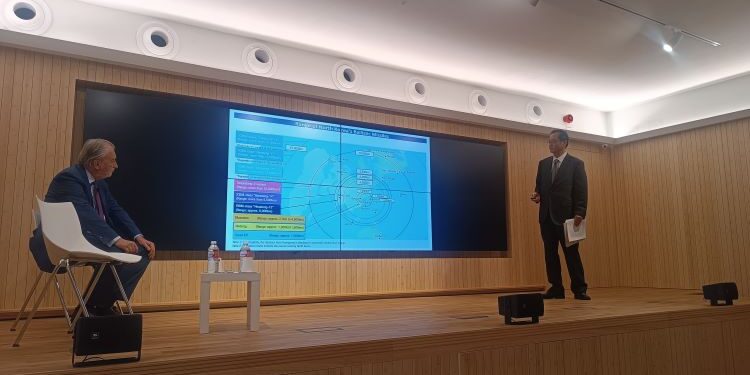The Diplomat
The Japanese ambassador to Spain, Takahiro Nakamae, stressed in a conference given at the Ortega-Maranón Foundation and organized by the Spanish Foreign Policy Association (APEE), that stability in the Taiwan Strait is critical for Japan.
After being introduced by the president of the APEE, José María Beneyto, Nakamae, who has been in charge of the Japanese Embassy in Madrid since December 2022, reviewed his country’s foreign and security policy within the framework of the new global challenges.
Thus, he focused on the implications of Russia’s invasion of Ukraine, and the alliance that country maintains with China, one of the great current concerns of the Japanese authorities. Nakamae believes that Moscow is trampling on international law and shaking the foundations of world order, and recalls that it has threatened the use of nuclear weapons, 79 years after such use was a reality.
Along these lines, the ambassador warned that some emerging countries, including China, are developing their military forces very quickly and with little transparency. He highlighted Japan’s concern over what he sees as the Beijing regime’s expansionism in the South China Sea, including the construction of fortifications on artificial islets.
According to Nakamae, Chinese expansionism is carried out through two lines of anti-access defense and the establishment of an enemy denial area. These lines – he indicated – are precisely over Japan, Taiwan and even reach Guam, a US island with an important military presence.
For the ambassador, China is carrying out a “strategic challenge of an unprecedented scale”, which, in his opinion, not only threatens regional stability, but also endangers freedom of navigation, which is an essential principle of international law. maritime.
Using a graphic, the ambassador referred to China’s claim to the Senkaku Islands “which – he recalled – belong to Japan and are very close to Taiwan” and to the great increase experienced since 2012 in the intrusion of the Chinese Navy and fishing vessels in Japanese territorial waters.
Given this attitude, Nakamae said that Japan has adopted a new defense policy that adheres to the doctrine of a free and open Indo-Pacific. And he stressed that “stability and free navigation in the Taiwan Strait is of critical interest to Japan.” In addition, he emphasized that the island depends 90% on oil imports from the Middle East, so “there is more and more awareness among Japanese public opinion that if something happens in Taiwan we cannot stay and do nothing.”
The ambassador assured that Japan and Taiwan help each other, although he acknowledged that there is no mechanism similar to NATO in the area, but simply bilateral defense agreements and quadrilateral dialogue schemes such as the Quad between the United States, Japan, Australia and India.
In any case, Takahiro Nakamae insisted that no one is interested in an escalation of the conflict in the region and advocated for “continuing dialogue and urging that Beijing act in accordance with its international responsibilities,” among other reasons due to the close economic ties between Japan and China, which is the main trading partner of the Japanese country. Therefore, he noted that a complete “decoupling” from China is not a viable option for Japan.
The ambassador insisted that dialogue and cooperation are essential to manage common challenges and promote stability in the region, in addition to addressing global problems such as climate change or the management of natural resources.
Likewise, Nakamae discussed in his speech the importance of economic security, emphasizing that, in the current context, it is as crucial as military security, which is why it is necessary to have a robust defense industry.
He concluded his speech by reaffirming Japan’s commitment to a free and open maritime order, conceived as a global common good. And he noted that this concept, developed by Japan about eight years ago, remains a cornerstone of its foreign and defense policy.







